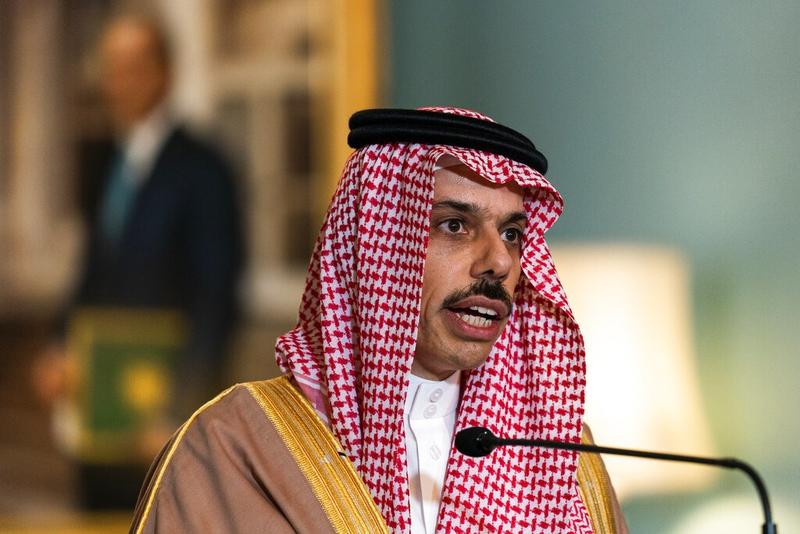 In this Oct 14, 2020 file photo, Saudi Minister of Foreign Affairs Prince Faisal bin Farhan Al Saud speaks during his meeting with Secretary of State Mike Pompeo, at the State Department in Washington. (MANUEL BALCE CENETA/POOL/AP)
In this Oct 14, 2020 file photo, Saudi Minister of Foreign Affairs Prince Faisal bin Farhan Al Saud speaks during his meeting with Secretary of State Mike Pompeo, at the State Department in Washington. (MANUEL BALCE CENETA/POOL/AP)
Saudi Arabia and Qatar said on Friday they were making progress toward ending a rift that’s divided the Gulf Arab region for more than three years, nudged by a Trump administration keen to rack up foreign policy gains in its last days.
“We are hopeful that things will move in the right direction right now,” Qatari Foreign Minister Mohammed Bin Abdulrahman Al Thani said in a virtual interview as part of the Mediterranean Dialogues conference. “We cannot predict whether it’s going to be imminent and it’s going to resolve the whole issue in one day.”
READ MORE: Four Arab states leading Qatar boycott vow more measures
Later in the day, Saudi Arabia’s Foreign Minister Faisal bin Farhan tweeted that he was looking forward to a successful outcome to Gulf reconciliation talks mediated by the US and Kuwait.
Several people with knowledge of the talks said that Saudi Arabia and Qatar are close to a preliminary rapprochement that may not initially include the United Arab Emirates, Bahrain and Egypt -- the other three countries that severed diplomatic and trade ties with Qatar in June 2017
The comments offer the first tentative confirmation that a diplomatic push to end the divisions, which have disrupted trade and travel in the world’s top oil-producing region, was nearing fruition. Talk of a potential breakthrough began to circulate this week following a visit from US President Donald Trump’s son-in-law Jared Kushner to the region.
Several people with knowledge of the talks said that Saudi Arabia and Qatar are close to a preliminary rapprochement that may not initially include the United Arab Emirates, Bahrain and Egypt -- the other three countries that severed diplomatic and trade ties with Qatar in June 2017. One person said a broader realignment remained a long way off as the underlying issues, such as Doha’s good relations with Tehran, remained unresolved.
In a brief televised statement on Friday, Kuwait’s Foreign Ministry said talks had been “fruitful,” without giving details. All sides had expressed a keenness to reach a final agreement and ensure stability in the Gulf region, it said. Neighboring Oman also welcomed the efforts.
The sanctions by Qatar’s neighbors have forced airlines to reroute air traffic, disrupted commercial ties and complicated business across the six-member Gulf Cooperation Council.
As the split has dragged on, Saudi Arabia has become more concerned that the incoming Biden administration will exert less pressure on the Iran than Trump, leaving its oil facilities more exposed, and is motivated to move on, diplomats and analysts said. The UAE has been more reluctant to patch up ties with Qatar, however, preferring to focus on building its nascent relations with Israel while avoiding any escalation with Iran, they said.
Asked whether Qatar would be willing to accept an agreement that did not include all four boycotting countries, Al Thani said: “Any kind of resolution it should be a holistic resolution. Qatar is not distinguishing between any country and other. We want to see the GCC united most importantly.”
Asked whether Qatar would be willing to accept an agreement that did not include all four boycotting countries, Al Thani said: “Any kind of resolution it should be a holistic resolution. Qatar is not distinguishing between any country and other. We want to see the GCC united most importantly.”
The boycotting countries had accused Qatar of bankrolling militant groups and undermining regional attempts to isolate Iran, whose regional influence and nuclear ambitions they fear. It has, for decades, given shelter to Islamist dissidents and at times assisted countries governed by the Muslim Brotherhood. However, it denies accusations that it funds that group directly or supports terrorism.
ALSO READ: Qatar rules out establishing ties with Israel, official says
The embargo hurt Qatar but the tiny, gas-rich country was ultimately able to cushion the economic blow. Instead, the Qatari government reached out to Iran, Turkey and others to broaden its trade options or reroute its flights. The effect was to further cement the region’s geopolitical faultlines.
The Trump administration has been keen to resolve the dispute among its Arab allies, which it sees as a distraction from efforts to pressure Iran. It’s also been pushing other Middle Eastern countries to follow the UAE and Bahrain in normalizing relations with Israel, as Trump races to bake in his policies before leaving the White House.
Al Thani said he does not see Qatar following suit and signing up to the so-called Abraham Accords with Israel any time soon.
“The GCC crisis is something that’s not related to the Abraham Accords or to any normalization with Israel,” he said, emphasizing that Palestinians should be at the heart of any discussions with Israel. “Right now I don’t see that normalization of Qatar and Israel is going to add value to the Palestinian people.”
The Qatari minister said unity among the Gulf Arab nations would complement efforts to resolve tensions between the US and Iran and called for talks between the GCC and its neighbor across the Persian Gulf.
“What we are missing right now is a formula for coexistence between the Gulf countries and Iran,” he said. “We are neighbors. We can’t change geography. The geography is our destiny so we have to work with each other.”


